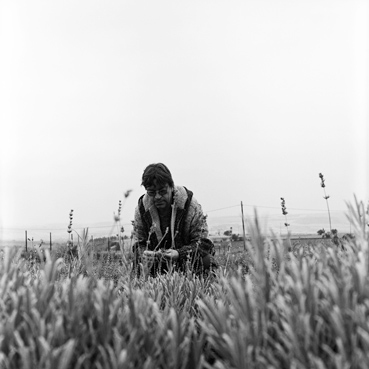-

- Nikos, 53 years old, landscape architect and cultivator of aromatic plants, Thessaloniki
»I had to give up my job as a landscape architect, because I couldn't get projects during the crisis.
Even when still working I dealt with aromatic plants and I got the idea to specialize in growing aromatic plants.
I found a 40 years old, 4000 sqm glasshouse one year ago, which hadn't been used since 2000.
I grew 25 to 30 species of aromatic plants there with two colleagues.
The complete growth cycle takes about two months in the glasshouse and is running in three steps:
First, the cuttings are planted in pots with a perlite ⁄ turf mixture for about 20 days and are dusted with a fine mist; that's when the first root formations take place.
After this the pots with the cuttings are placed under normal irrigation on a cement bench, again for about 20 days.
The last step is to acclimatise the plants outside the glass house before they are sold to farmers who grow them on their fields or to garden centers.
The production – without heating – is possible for over 10 months here, except in January and February.
Our bestselling plant is the Greek oregano (Origanum hirtum), as there is a four times higher content of carvacrol in comparison to other species of oregano. (Note: Carvacrol is a component in the essential oil of Origanum, which has bactericidal and fungicidal properties and therefore has a special medical importance too.)
The mother plants for the cuttings are grown on a field, that is just 400m NN and on a slight incline to the sea.
Hence there blows ever a light wind, something very important for an ideal microclimate of aromatic plants.
There was no state support for my company, instead the registration of the electric meter in the glasshouse took six months.
But I had to do something and I see the production of aromatic plants as a good chance for the future, even if the biological market is still in the early stages in Greece.
We have the great advantage that these plants are growing wild here for many years, they have adapted to the climate, require little water and no fertilizer and therefore they are easy to grow.«
<< >>
